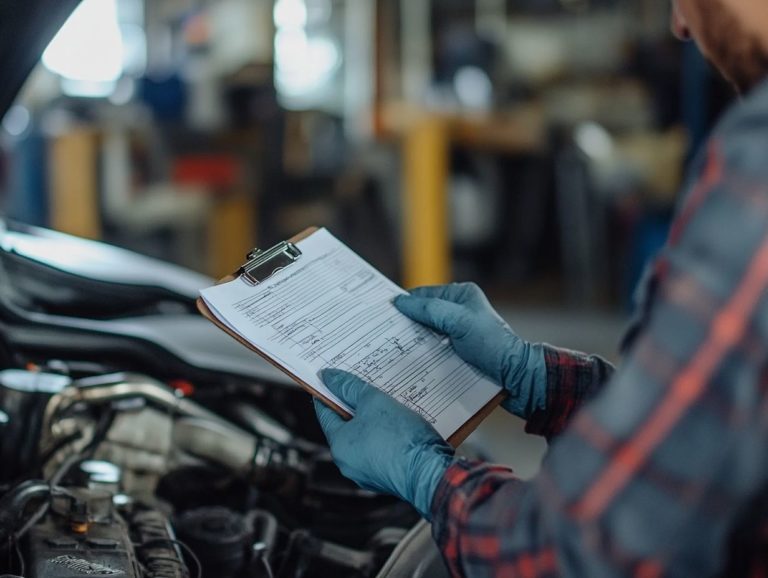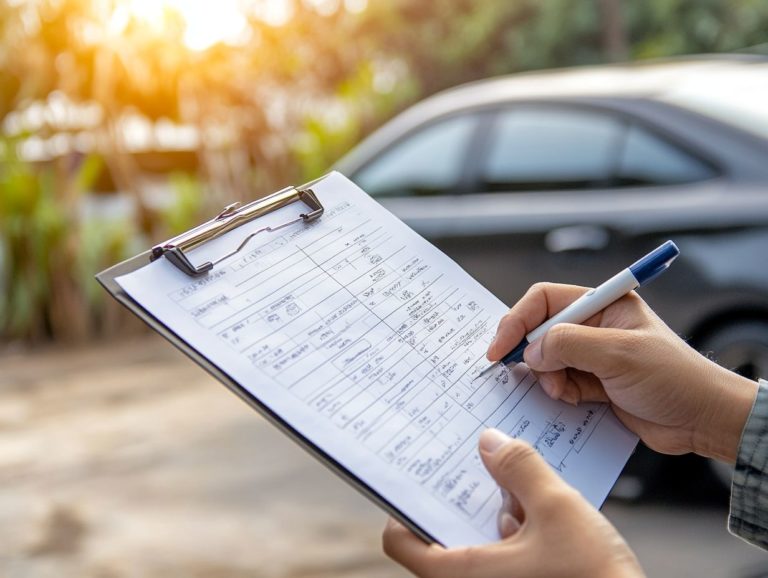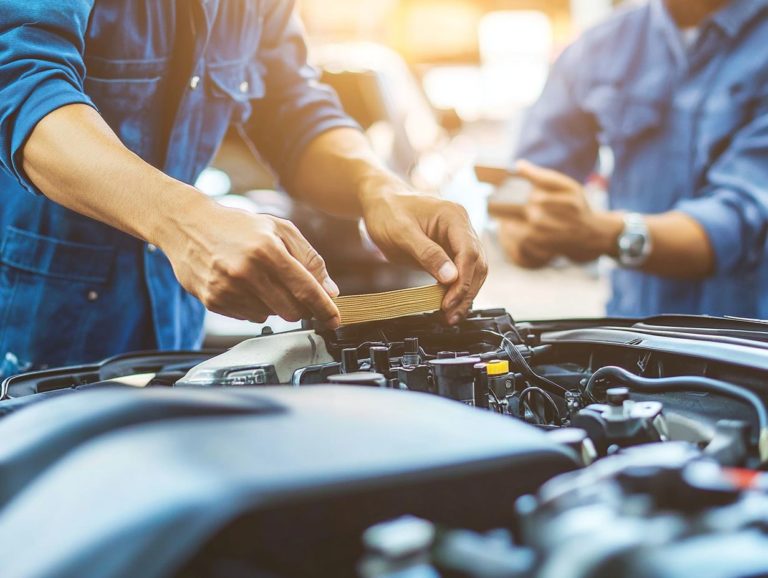Understanding the Importance of a Pre-Purchase Inspection
When you’re in the market for a home or a vehicle, it’s easy to let the thrill of the purchase overshadow the importance of thorough due diligence. A pre-purchase inspection is an essential step in securing a wise investment.
This article explores what a pre-purchase inspection involves, highlights its significance for both buyers and sellers, and outlines what to expect during the process.
It also provides guidance on selecting a qualified car mechanic and interpreting the results to negotiate effectively.
Stay informed and empowered as you navigate this crucial aspect of your buying journey.
Contents
- Key Takeaways:
- What is a Pre-Purchase Inspection?
- Why is a Pre-Purchase Inspection Important?
- What is Typically Included in a Pre-Purchase Inspection?
- How to Choose a Qualified Inspector
- What to Expect During the Inspection
- Interpreting the Inspection Report
- Negotiating Based on the Inspection Results
- Frequently Asked Questions
- What is a pre-purchase inspection and why is it important?
- Who typically conducts a pre-purchase inspection?
- What is included in a pre-purchase inspection?
- Is a pre-purchase inspection necessary for all types of purchases?
- How much does a pre-purchase inspection typically cost?
- Can a pre-purchase inspection be used as a negotiating tool?
Key Takeaways:
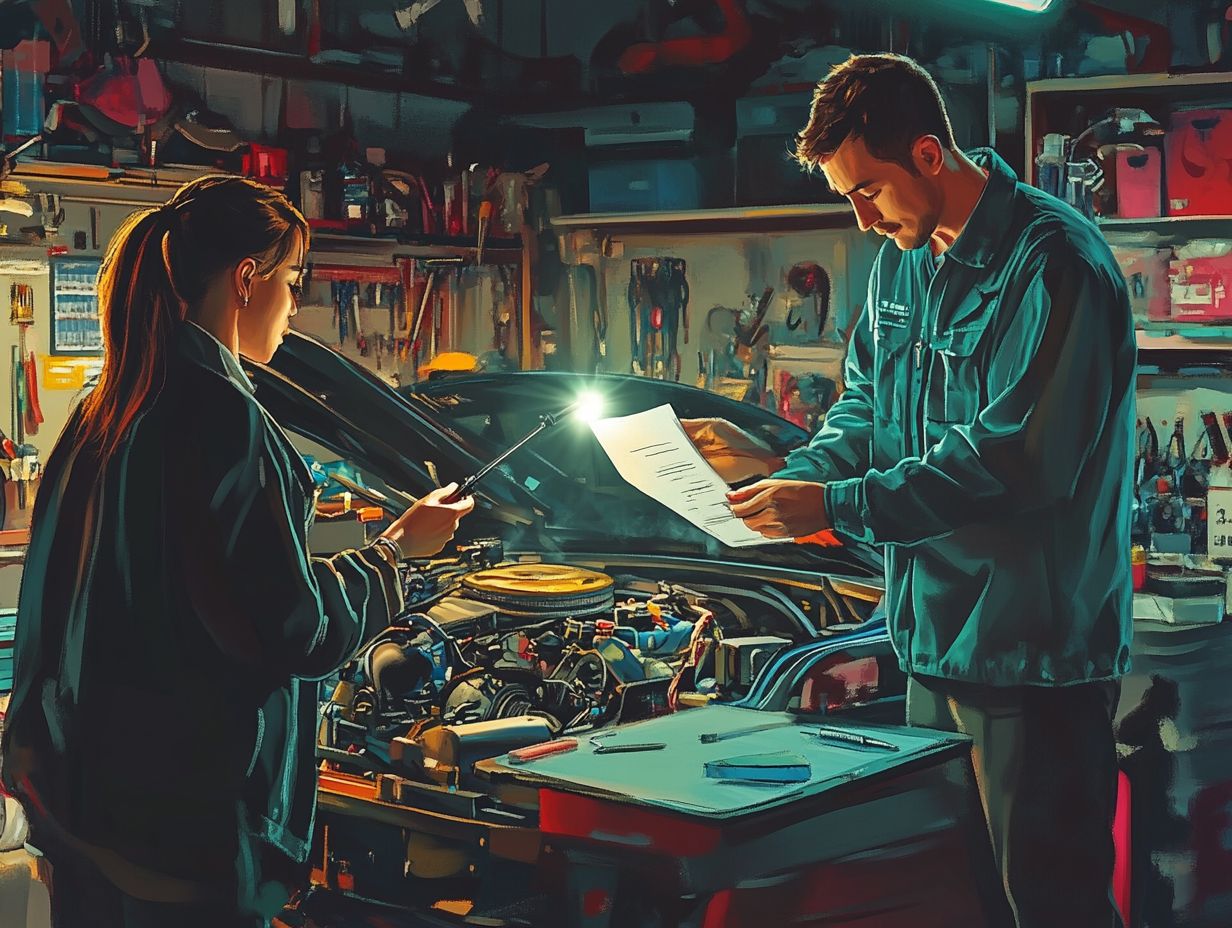
A pre-purchase inspection is a crucial step in the home buying process. It provides a thorough examination of a property’s condition to help buyers and sellers make informed decisions. Understanding the importance of a pre-purchase inspection includes benefits such as identifying potential issues, negotiating a fair price, and avoiding costly surprises after purchase. Choosing a qualified inspector and understanding the inspection process are essential for interpreting results effectively.
What is a Pre-Purchase Inspection?
A pre-purchase inspection is a key step in your vehicle buying journey. It allows you to thoroughly assess the condition of a used car before committing your hard-earned money.
Performed by a qualified car mechanic, this independent inspection reveals hidden issues, giving you the confidence to negotiate repair costs and understand the vehicle’s overall safety.
With this detailed evaluation, you can move forward with peace of mind, knowing you ve made an informed decision.
Definition and Purpose
A pre-purchase inspection is a comprehensive assessment performed by a mechanic to evaluate the mechanical and safety aspects of a used car before purchase.
This evaluation reveals hidden issues that could lead to costly surprises later, protecting your investment.
By identifying potential mechanical failures or safety hazards, the inspection equips you with invaluable insights, enabling informed decisions.
It s a crucial step in your buying journey, ensuring that the vehicle meets your aesthetic standards and operates reliably and safely.
In short, a detailed pre-purchase inspection helps you avoid future repair expenses and provides peace of mind as you drive off in your new ride.
Why is a Pre-Purchase Inspection Important?
A pre-purchase inspection is crucial whether you’re buying or selling in the used car market.
It offers vital insights into the vehicle’s safety and condition, significantly enhancing your negotiation leverage. Uncovering hidden issues early allows you to make informed decisions, leading to a smoother transaction process.
Benefits for Buyers and Sellers
The advantages of a pre-purchase inspection are substantial for both buyers and sellers, fostering transparency and trust throughout the vehicle transaction process.
As a buyer, a comprehensive inspection report gives you enhanced negotiation leverage. Issues identified during the inspection can serve as bargaining chips to secure a better price. For example, if rust is discovered, you can confidently discuss a price reduction or request repairs before closing the deal.
Sellers, on the other hand, gain peace of mind knowing their vehicle has undergone a professional evaluation. This assurance boosts their confidence and often results in a quicker sale, as buyers are typically drawn to vehicles that have been thoroughly inspected for quality.
Ultimately, this collaborative approach creates a smoother transaction, enriching the buying and selling experience for everyone involved.
What is Typically Included in a Pre-Purchase Inspection?
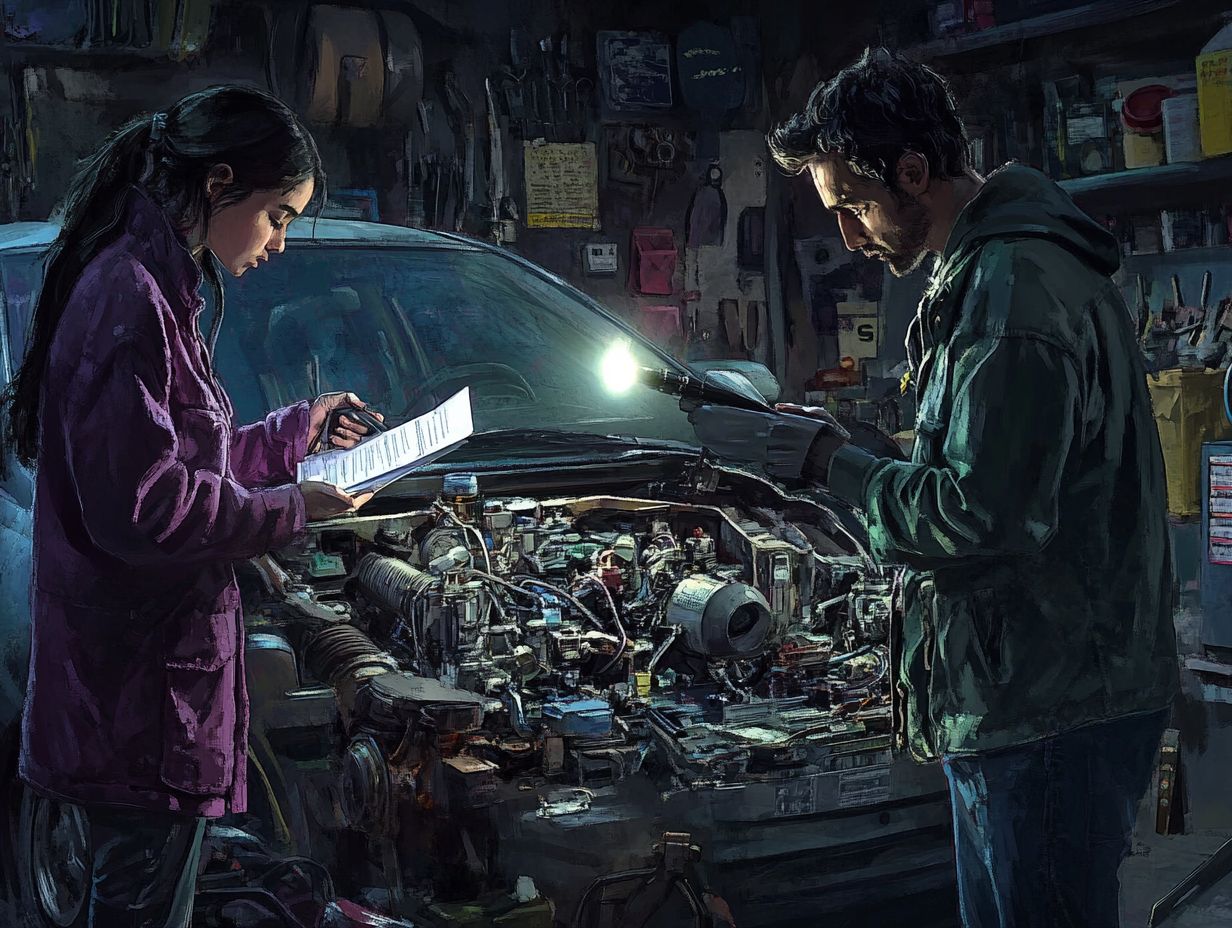
A comprehensive pre-purchase inspection includes a detailed checklist that covers various aspects of the vehicle, such as engine performance, transmission functionality, brakes, and suspension.
Conducted by a skilled automotive technician, this thorough examination looks into key maintenance checks, identifying any safety concerns or mechanical issues that could affect the vehicle’s reliability.
This helps you confidently choose the right vehicle!
Inspection Checklist and Process
The inspection checklist for a pre-purchase evaluation includes several critical components, such as the engine, transmission, brakes, and overall vehicle condition.
Each of these elements is essential for determining the vehicle s safety and reliability. For instance, a well-functioning engine is vital for optimal performance and efficiency, helping you avoid costly repairs later on.
Inspecting the transmission can reveal potential shifting issues that might impact your driving experience.
The brakes, a crucial safety component, must be examined for wear and responsiveness to ensure quick stopping power.
Assessing the overall vehicle condition, including tires and suspension, gives you insight into the longevity of your investment.
Every item on this checklist plays a significant role in the overall assessment, ultimately providing you with peace of mind as a prospective buyer.
How to Choose a Qualified Inspector
Selecting a qualified inspector for a pre-purchase inspection is essential for obtaining a trustworthy assessment of a vehicle’s condition, especially in the challenging used car market.
Choose a technician who is ASE-certified, meaning they have passed rigorous tests to show their automotive expertise. This ensures an independent inspection that can uncover potential hidden issues.
This thorough evaluation allows you to proceed with your purchase confidently.
Key Factors to Consider
When choosing a qualified inspector for your pre-purchase inspection, consider these key factors:
- Their reputation: A good reputation means they are trusted by past clients.
- Certification: This confirms they have the necessary credentials and are knowledgeable about current standards and best practices.
- Experience in the automotive field: Inspectors with experience in the specific make and model of your vehicle are better at identifying potential issues.
These factors combine to create a comprehensive evaluation, giving you reassurance before making a significant investment.
What to Expect During the Inspection
During a pre-purchase inspection, expect a thorough evaluation that typically takes one to two hours, depending on the vehicle’s condition and age.
An experienced automotive technician will carefully assess various components, providing valuable insights into potential findings, repair costs, and overall maintenance needs.
This comprehensive analysis enables you to make informed decisions throughout the vehicle purchasing process.
Timeline and Possible Findings
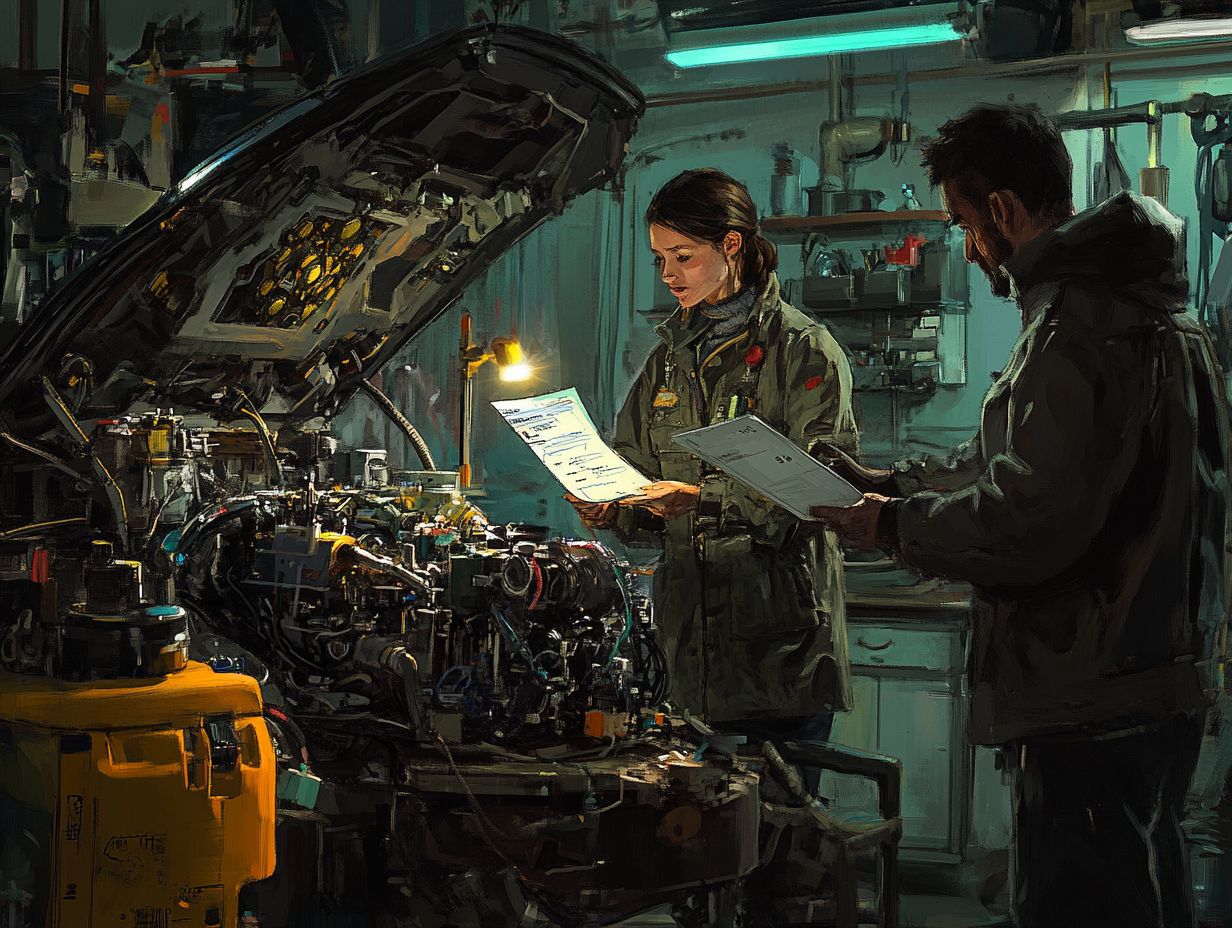
The timeline for your pre-purchase inspection typically ranges from one to two hours. During this crucial period, a car inspector will meticulously evaluate the vehicle for any potential issues.
As they conduct this assessment, you may discover a range of car problems, including engine issues, transmission irregularities, or deficiencies in the brake system. Safety concerns like faulty lights, worn tires, or compromised structural integrity might also come to light.
The duration of the inspection can vary significantly depending on the overall condition of the vehicle. For instance, a well-maintained car might breeze through the process. In contrast, an older or poorly maintained vehicle could require a more thorough examination.
Ultimately, this comprehensive inspection not only clarifies the car s mechanical status but also enables you to make informed decisions about your potential purchase.
Interpreting the Inspection Report
Interpreting the inspection report generated by a car inspector is crucial for you as a prospective buyer. This report offers a detailed overview of the vehicle’s condition, highlighting key findings and specific advice.
Grasping these results can profoundly impact your decision-making process, particularly regarding safety concerns and potential repair costs associated with the vehicle.
Understanding the Results and Recommendations
Understanding the results and recommendations from the inspection report is crucial for you, helping you determine the vehicle’s condition and any potential issues that may need your attention.
To effectively analyze these findings, focus on the major areas highlighted in the report, such as:
- Mechanical integrity
- Safety features
- Signs of wear that could suggest future problems
By concentrating on the inspector’s recommendations, you can assess whether the necessary repairs align with your budget and timeline. Consider the vehicle’s resale value as well, especially if the report raises any potential red flags.
Ultimately, a thoughtful evaluation of these factors can enable you to make a well-informed decision, ensuring your investment is in a reliable vehicle!
Negotiating Based on the Inspection Results
Negotiating based on inspection results gives you an advantage in the pre-purchase process. It allows you to leverage the findings effectively during discussions with sellers.
By presenting the hidden issues identified in the inspection report, along with estimated repair costs, you can negotiate a fair price. This strategy ensures you avoid overpaying for a vehicle that may come with unforeseen complications!
How to Use the Report in Your Negotiations
Using the inspection report effectively in negotiations enables you to advocate for a fair price based on the vehicle’s current condition and any necessary repairs.
By presenting detailed findings, such as specific repair costs and spotlighting hidden issues that may elude casual observation, you can significantly bolster your position.
It s crucial to itemize these repairs and, whenever possible, provide quotes from local garages to further validate your claims. Highlighting any serious problems uncovered in the report can serve as powerful leverage in your negotiations for a more favorable price.
This thorough approach not only demonstrates your diligence but also serves as a reminder to the seller of the vehicle s true state, reinforcing the critical role of the inspection findings in securing a satisfactory deal.
Frequently Asked Questions
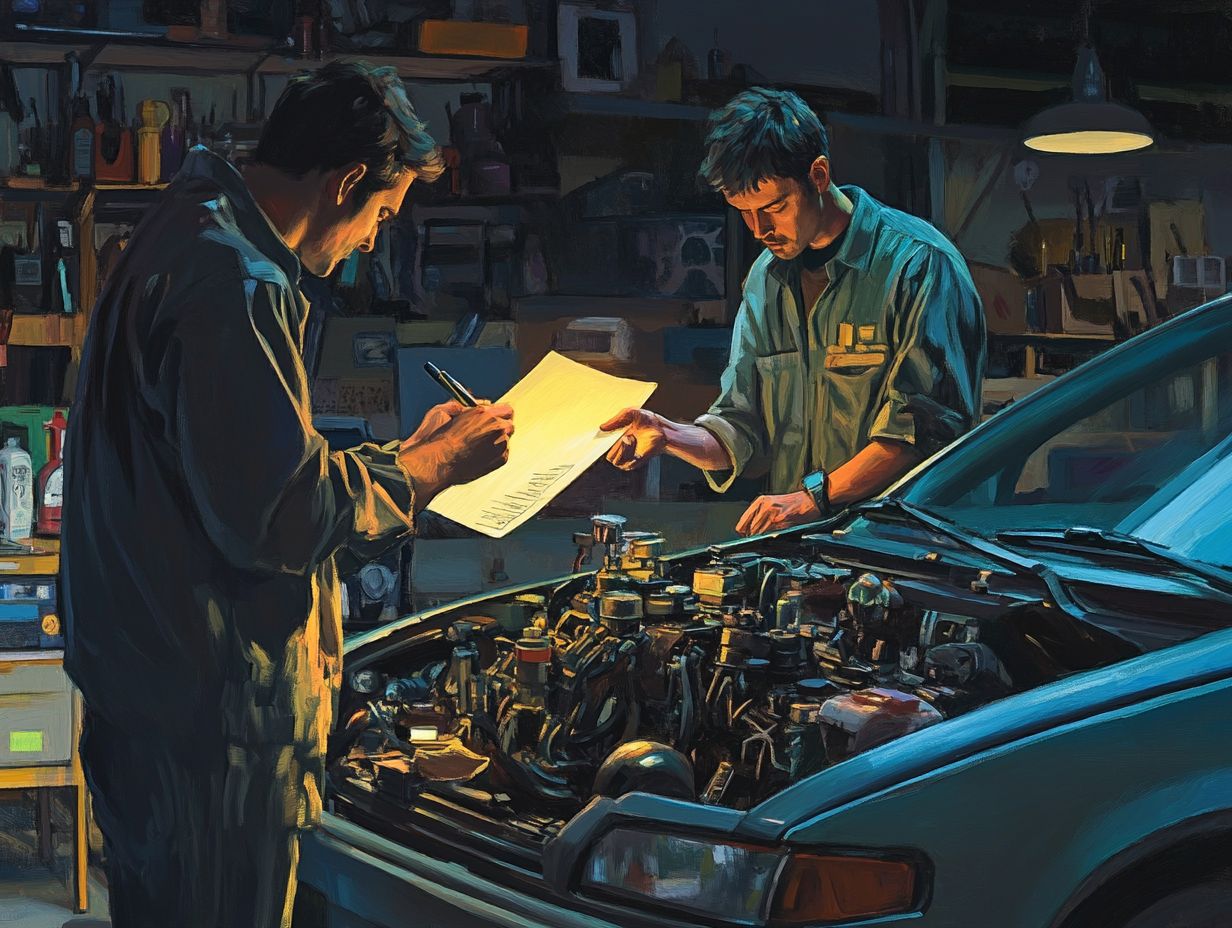
What is a pre-purchase inspection and why is it important?
A pre-purchase inspection is a thorough evaluation of a vehicle conducted by a professional before it is purchased. It is important because it can uncover any potential issues or problems that may not be visible to the untrained eye, saving the buyer from unexpected expenses and headaches in the future.
Who typically conducts a pre-purchase inspection?
A pre-purchase inspection is conducted by a licensed inspector who specializes in examining homes or items for buyers. Hiring a qualified inspector ensures an accurate assessment.
What is included in a pre-purchase inspection?
This inspection includes a visual examination of the property or item. It also provides a detailed report outlining any issues found, such as problems with the structure, electrical systems, and overall condition.
Is a pre-purchase inspection necessary for all types of purchases?
Pre-purchase inspections are essential for significant purchases. Whether it s a car, boat, or artwork, an inspection offers valuable information for buyers.
How much does a pre-purchase inspection typically cost?
The cost varies based on the size and complexity of what s being inspected. On average, it ranges from a few hundred to a few thousand dollars, a small price for potential savings and peace of mind.
Can a pre-purchase inspection be used as a negotiating tool?
Yes! The findings from a pre-purchase inspection can be powerful during negotiations. If issues arise, buyers can negotiate a lower price or request repairs before finalizing the purchase.

